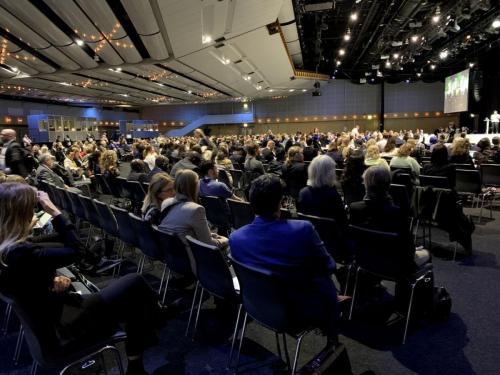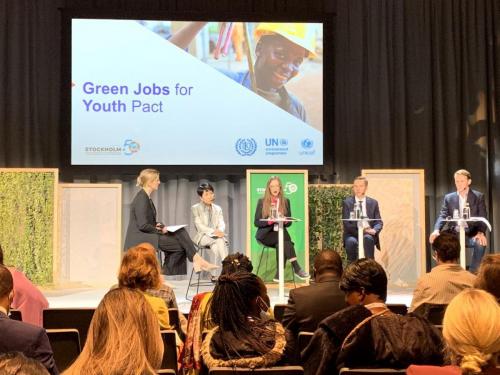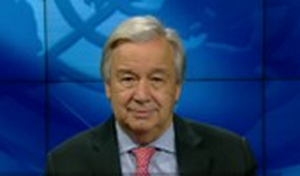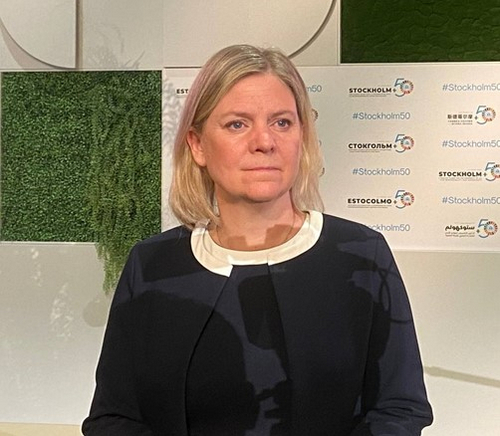Stockholm+50 Kicked Off
World leaders and environmentalists participate in Stockholm+50 conference

The Stockholm+50 Conference took place on June 2-3, 2022 at Stockholmsmässan in Stockholm, Sweden.
The “Stockholm+50: a healthy planet for the prosperity of all – our responsibility, our opportunity” (Stockholm+50) conference kicked off today with the first and second Plenary meeting and various side events on June 3, 2022. The conference, co-hosted by Sweden and Kenya, took place over the course of June 2 and June 3 at Stockholmsmässan in Stockholm, Sweden.

During the “Green Jobs for Youth Pact” side event, speakers discussed ways to bring younger generations into jobs that are with environmentally conscious companies.
Stockholm+50 gave leaders an opportunity to reflect on the previously established agenda on environmental issues and construct a roadmap for future collaborative action to protect the environment. This major global environmentally-centric conference was convened by the United Nations and held during the week of World Environment Day and five decades after the United Nations Conference on the Human Environment in 1972.

UN Secretary-General António Guterres delivered his remarks, emphasizing, “The 17 Sustainable Development Goals and the Paris Agreement show the way. But we must act on these commitments.” (Photo Credit: UN)
UN Secretary-General António Guterres delivered his remarks, emphasizing, “The 17 Sustainable Development Goals and the Paris Agreement show the way. But we must act on these commitments.” He also noted, “We must place true value on the environment and go beyond Gross Domestic Product as a measure of human progress and well-being. Let us not forget that when we destroy a forest, we are creating GDP. When we overfish, we are creating GDP. GDP is not a way to measure richness in the present situation in the world.” “Throughout history, humanity has shown that we are capable of great things. But only when we work together. If we want to survive and thrive, let us protect and nurture our planet, that is our only home,” he added.

Prime Minister Magdalena Andersson welcomed all participants and emphasized, “Sweden’s message is plain and clear: Going green is not only possible, it is the path to create growth, jobs and prosperity for all.”
Swedish Prime Minister Magdalena Andersson welcomed all participants and emphasized, “Climate action is one of my government’s priorities in the years ahead. We will speed up this process.” She also pointed out, “Sweden’s message is plain and clear: Going green is not only possible, it is the path to create growth, jobs and prosperity for all.” She concluded by saying, “Let our work be guided by the words spoken at the 1972 Conference by the Prime Minister, Olof Palme, ‘There is no individual future, neither for human beings, nor for nations. Our future is common. We must share it together. We must shape it together.’”
This year’s conference highlighted the future, specifically the role that youth will play in creating a healthy planet and ensuring sustainability in a digital age filled with big data and artificial intelligence applications.
A side event titled “Powering Change: Young People leading the COVID-19 response and recovery” featured speakers who talked about their efforts as young people to mitigate and recover from Covid-19 or empower young people to do so. The event was organized by the Big Six, the world’s largest global youth organizations, and Global Youth Mobilization (GYM), a collective of youth taking action to improve their lives in a Covid-19 world.
Founder and president of the Green Hope Foundation Kehkashan Basu talked about her program to reinvigorate communities that lost access to education during the pandemic in rural Bangladesh.
“The village school had been closed for over a year, so the children were not going to school. They had no digital alternative because of the digital divide…. the adults had lost their jobs as a result of the pandemic and because none of them were educated either, they had nothing to really fall back on,” she said. “What we started doing was providing non-formal education through creative modes of communication like art, music, dance, drama and sports, engaging with the children and the young people, educating them about resilience and particularly about how health and sanitation are extremely important.”
The emphasis on youth involvement continued at the “Green Jobs for Youth Pact” side event in which speakers discussed ways to bring younger generations into jobs that are with environmentally conscious companies and featured speakers from the private sector and youth working in the space. Senior Director of Economic Graph Partnership at LinkedIn spoke about the ways that LinkedIn utilizes big data on user activity to analyze labor markets and provide recommendations to encourage youth to recruit for sustainable jobs.
"[There are] 830 million people on LinkedIn that are connecting daily with one another: they're researching companies, looking at jobs, applying for jobs, all sorts of business activity. As we view the access metrics in real time, we come close to approximating the activity in the global economy. And this is a concept that we refer to as the economic graph, it's a graph of economic opportunity,” Williams said. “We've started to turn our attention to the green economy to look specifically at what occupations are growing, what segments of the working population are embracing green skills and new jobs.”
According to Williams, renewables and environmental jobs on LinkedIn are growing quickly at 237% while oil and gas jobs grew 19% in the last five years. Williams also noted that professionals that have “green skills” on the LinkedIn platform are more resilient in layoffs, looking at recent Covid-19 employment trends. Other benefits of working in a sustainability role or at a company that cares about sustainability were highlighted by other speakers.
“Youth [are] facing so many anxieties at the same time… economic anxieties about the future of our planet, a job with purpose, let alone any job is something that constitutes a significant factor of mental health stress for many people,” UN Secretary General Youth Advisor on Climate Change said. “The role of green jobs for youth is an indicator of a stable future and something they can look forward to.”
Big data applications through a digital-age lens were also discussed at an event titled “Our Action Plan for a Sustainable Planet in the Digital Age.” The goal of the event was to discuss the positive and negative impacts of sustainable digitization and accelerate sustainable and digital innovation. The event also served as the official launch of The Coalition for Digital Environmental Sustainability (CODES) and emphasized the idea that the capabilities created in the last few decades due to the digital revolution are crucial to accelerating sustainable development.
According to President of the German Environmental Agency Dirk Messner, 40% of large corporations already have science-based climate strategies, but only 13% of them are utilizing the power of technology, including artificial intelligence and machine learning tools, to solve the issues stated in these strategies.
“Digitalization has many potentials to make sustainability possible, but it can also drive and accelerate unsustainable growth, resource consumption, inequalities and social division,” he said. “So, how are we going to bring this together? This is the important point. Digitalization needs to be shaped, it needs to be steered, it needs to be governed.”
The conference continued on June 3 with the 3rd and 4th plenary sessions and other sessions.
- 271 reads
Human Rights
Fostering a More Humane World: The 28th Eurasian Economic Summi

Conscience, Hope, and Action: Keys to Global Peace and Sustainability

Ringing FOWPAL’s Peace Bell for the World:Nobel Peace Prize Laureates’ Visions and Actions

Protecting the World’s Cultural Diversity for a Sustainable Future

Puppet Show I International Friendship Day 2020

